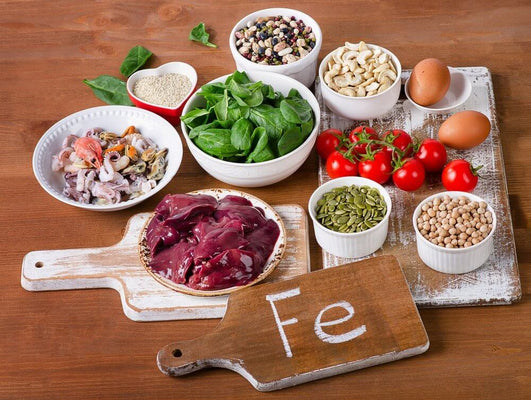Iron is an essential nutrient gotten from numerous plant-based diets and a wide variety of other foods. The relationship between iron and anaemia could be likened to rickets and vitamin D.
A lack of this healthy nutrient could lead to several deficiencies. This deficiency could be in mild or more severe cases. While anaemia, a deficiency of iron, is quite common, many people can’t tell if they have it or not.
In this post, we will look more closely at the signs, causes, and treatments of iron deficiency.
Causes of iron deficiency
This deficiency happens when the body does not have enough iron to make haemoglobin resulting in anaemia. Haemoglobin does not just give the blood its red colour but also allows the transport of oxygen-rich blood.
In the absence of iron, the body can not make enough haemoglobin. This iron deficiency can be brought upon by;
Poor iron intake
An intake of an iron-rich diet provides your body with iron regularly. Little or no iron in your diet would most likely result in its deficiency. Supplements could, however, breach this gap!
Lack of iron absorption
Foods, including those rich in iron, enter the small intestine for absorption. Some intestinal disorders like celiac disease can prevent this absorption.
So while you may eat foods rich in this nutrient, the body can not utilize it. Thus, causing an iron deficiency. It sometimes takes a surgical procedure to treat this.
Pregnancy
Women who are pregnant demand for iron is higher than average. Their iron stores must serve both their increased blood volume and as much as their developing fetus. Pregnant women, therefore, need to consume extra iron.

Loss of blood
Anything that leads to blood loss, from sickness to menstruation or accidents, could take a toll on the amount of iron. Easily causing a deficiency. Internal bleeding is also a part of this list.
Genetics
Mutations and genetic disorders could play a key role in iron deficiency. Some hereditary diseases could make it challenging to absorb enough iron. Your body produces too much hepcidin as a result of this mutation.
For instance, a genetic error causing the production of excess hepcidin can prevent your intestines from absorbing iron. Other genetic disorders that result in unusual bleeding, like Hemophilia could also cause iron deficiency.
Symptoms of iron deficiency
In the early days, this may be difficult to see. However, it gets more severe with time. Some of the symptoms of iron deficiency anaemia are;
- Shortness of breath
- Broken nails
- Extreme tiredness
- Light skin
- Chest pain
- Accelerated heartbeat
- Tongue inflammation
- Headaches
- Lightheadedness
- Poor appetite

Effects of iron-deficient anaemia on the body
Most iron-deficiency anaemia patients are mild and have no side effects, hence easily fixed. However, if left untreated, anaemia or iron shortage might result in other medical issues like;
An unsteady heartbeat
Your heart has to pump more blood when you're anaemic. To make up for the reduced oxygen level. This can lead to cardiac failure or an enlarged heart.
Delivery complications
Iron deficiency could lead to premature delivery in pregnant women. To avoid this, women should include iron supplements in their prenatal care.
Delayed growth in babies
While it is often debatable if healthy kids need a supplement, kids low on certain nutrients certainly do. Kids low in iron may develop and grow at a slower pace than healthier kids.
They might also be more vulnerable to certain illnesses.
How to detect iron deficiency
Blood tests can are used to identify anaemia. The doctor carries out a complete blood count (CBC). The CBC shows the blood makeup and amount of substances like red blood cells, white blood cells, and even haemoglobin.
This blood information is used to identify an iron deficiency. Low haemoglobin level is a symptom of iron deficiency. Also, if the red blood cells are smaller in size, there is a high chance of an iron deficiency.
Other tests alongside tests for internal bleeding could be used.
Perfect time to visit a doctor
Self-diagnosis has always been frowned upon. Hence you should see a doctor as soon as you experience any symptoms that point to iron deficiency anaemia.
The more time you spend trying to figure it out yourself might lead to the more severe case. Having too much iron in your system can also be harmful since it can harm your liver and lead to other problems.
Conclusion
Iron is a mineral that is necessary for optimal health. Chewwies iron and vitamin C supplements are great products that can help balance the requirement of this essential nutrient in your body.


